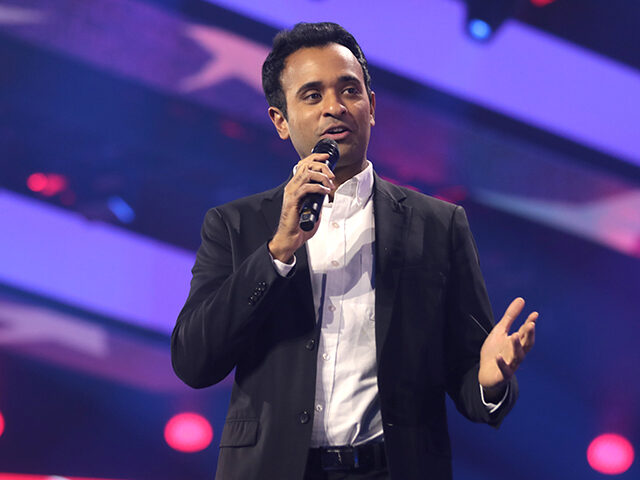Republican presidential candidate Vivek Ramaswamy released a detailed plan to end the war in Ukraine Thursday, saying he would cease American support for Ukraine and negotiate a peace treaty with Russia to weaken China — the U.S.’s real enemy.
“President Trump claims he would end the Russia-Ukraine war in 24 hours but refuses to say how. Ron DeSantis’ position is unclear, and other GOP candidates support continued U.S. involvement in Ukraine without specifying clear limits on engagement. If elected President, I will end the war by ceasing further U.S. support for Ukraine and negotiating a peace treaty with Russia that achieves a vital U.S. security objective: ceasing Russia’s growing military alliance with China,” he said in his statement.
He called the strategy the “mirror-image” of President Richard Nixon’s diplomatic overture to China that helped to lure it away from Russia in 1972. “Except this time Putin is the new Mao,” he wrote.
Citing a February 2022 “no-limits partnership” between China and Russia, he argued that a Sino-Russia alliance “presents the greatest military risk the U.S. has ever faced.” He argued:
Russia and China together outmatch the U.S. in every area of great power competition: geographic footprint, economic potential, industrial manufacturing might, conventional military power, and nuclear weapons, including super-Electromagnetic Pulse (EMP) weapons, which could destroy critical U.S. infrastructure resulting in hundreds of millions of American civilian casualties.
Beijing’s alliance with Russia provides China with sufficient strategic depth to chance direct conflict with the U.S. in the context of Taiwan, on the credible belief that the U.S. would not dare risk a simultaneous war with two allied nuclear superpowers. Russia is armed with the largest nuclear stockpile in the world and supersonic ballistic missiles well ahead of U.S. capabilities.
In the absence of Russia’s support, he argued, China would have to think twice before risking war with the U.S. over Taiwan.
Watch: Anti-Woke Presidential Candidate Vivek Ramaswamy: “I Would Not Give Another Dollar to Ukraine” If Elected President
He argued that President Joe Biden’s support for Ukraine is only pushing Russia into a closer military alliance with China, and increasing the risk of nuclear war.
Specifically, Ramaswamy said the U.S. should broker a Korean War-style armistice between Ukraine and Russia that codifies the current lines of control ceding most of the Donbas region to Russia.
“The agreement would suspend any further U.S. military assistance to Ukraine and a permanent moratorium on Ukraine joining NATO. Further, the U.S. and western NATO countries would end the Western sanctions regime against Russia, restore normal diplomatic relations with Russia with mutual security commitments, withdraw all troops from Ukraine, and close all their bases in Eastern Europe — returning to the reality that existed before the July 2016 Warsaw Summit. These concessions to Russia are significant,” he said.
He said in return, Russia would completely exit its military alliance with China, ending the 2001 Treaty of Good-Neighborliness and Friendly Cooperation and the 2022 no-limits partnership, permanently suspend all military-technical cooperation and joint military exercises with China, agree to re-enter the pre-2023 New Start nuclear non-proliferation treaty with the U.S., and withdraw all nuclear weapons and delivery capabilities from Belarus, Kaliningrad, and annexed regions of Ukraine, as well as all military forces from Cuba, Venezuela, and Nicaragua — “effectively eliminating Russia’s nuclear threat to the U.S. and Europe.”
He said this strategy would make sure that none of the three nuclear superpowers — the U.S., China, and Russia — are allied together, so that the U.S. and its allies could focus on Chinese aggression. He argued that if Russia reneged, it would be in a weaker position without Chinese support.
He also argued that Putin would be amenable to a peace deal, contrary to what Russia hawks say. “Putin’s apparent willingness last year to negotiate a peace agreement which addresses Russia’s security concerns suggest that he is open to a deal and provides the U.S. with negotiating leverage to bring him back to the table.”
He argued that the U.S. has already upheld the 1994 Budapest Memorandum, in which Ukraine gave up its nuclear weapons in exchange for security guarantees from the U.S. and the UK.
Watch: Zelensky Releases Movie Trailer-Style Video Marking One-Year Anniversary of War in Ukraine
Video Source: Volodymyr Zelensky via Storyful“In reality, the Budapest Memorandum merely reaffirmed the commitments of the U.S., the UK, and Russia to ‘respect the Independence and Sovereignty and the existing borders of Ukraine.’ The U.S. has more than fulfilled this promise,” he argued.
“Since 1994, the U.S. has armed and trained Ukraine. In the current war against Russia, the U.S. has already provided nearly $200 billion in military aid to Ukraine — nearly 20 times more than Ukraine’s own annual military budget and approximately equal to Ukraine’s entire GDP — which helped Ukraine successfully fight the Russian invasion to a standstill.”
He concluded:
With China’s growing military support of Russia in the war, Ukraine will not defeat Russia militarily in absence of extraordinary U.S. intervention. Such intervention would badly deplete U.S. military resources needed for land conflict in Taiwan which may itself be China’s objective in backing Russia. Under my peace plan, Ukraine will still emerge with its sovereignty intact and Russia permanently diminished as a foe. Ukraine’s best path to preserving its own security is to accept a U.S.-negotiated agreement backstopped by Russian commitments to the U.S.
“Opponents of U.S. engagement in Ukraine should embrace the possibility that we can accomplish more than just saving money by ending the war. We can also achieve the most vital U.S. security objective of the 21st century: deterring Chinese aggression. If elected, I will lead accordingly.”
Follow Breitbart News’s Kristina Wong on Twitter, Truth Social, or on Facebook.

COMMENTS
Please let us know if you're having issues with commenting.